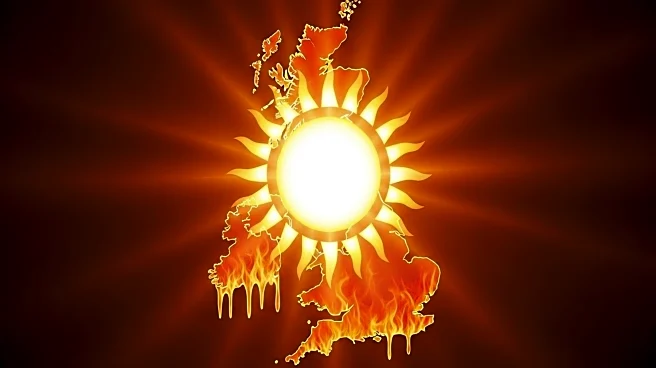What's Happening?
The UK has experienced its hottest summer on record, with Wales recording a mean temperature of 16.06°C, surpassing the previous record set in 1995. This summer was marked by prolonged heatwaves, with temperatures briefly meeting heatwave criteria on four separate occasions. The hottest day was recorded on July 12, with Cardiff's Bute Park reaching 33.1°C. The summer was also the driest and sunniest since 2022, with east Wales receiving only half of its average rainfall. The Met Office attributes these conditions to climate change, which is making summers hotter and drier. Reservoir levels are lower than normal due to the dry summer following Wales' driest spring in over 50 years.
Why It's Important?
The record-breaking temperatures and dry conditions highlight the growing impact of climate change on the UK. These changes have significant implications for water resources, agriculture, and public health. Lower reservoir levels could lead to water shortages, affecting both domestic and agricultural water supply. The increased frequency and intensity of heatwaves pose health risks, particularly for vulnerable populations. Additionally, the dry conditions can exacerbate the risk of wildfires and impact crop yields, potentially leading to economic losses in the agricultural sector.
What's Next?
As climate change continues to influence weather patterns, the UK may need to implement more robust measures to manage water resources and protect public health. This could include investing in infrastructure to improve water storage and distribution, as well as developing strategies to mitigate the health impacts of heatwaves. Policymakers may also need to consider long-term strategies to adapt to changing climate conditions, including enhancing agricultural resilience and reducing greenhouse gas emissions.
Beyond the Headlines
The record heatwave in the UK underscores the urgent need for global action on climate change. It serves as a reminder of the interconnectedness of climate systems and the potential for widespread impacts. The situation in the UK could prompt other nations to reevaluate their climate policies and commitments, particularly in the lead-up to international climate negotiations. The ethical responsibility to address climate change and protect future generations may drive increased advocacy and policy changes.









